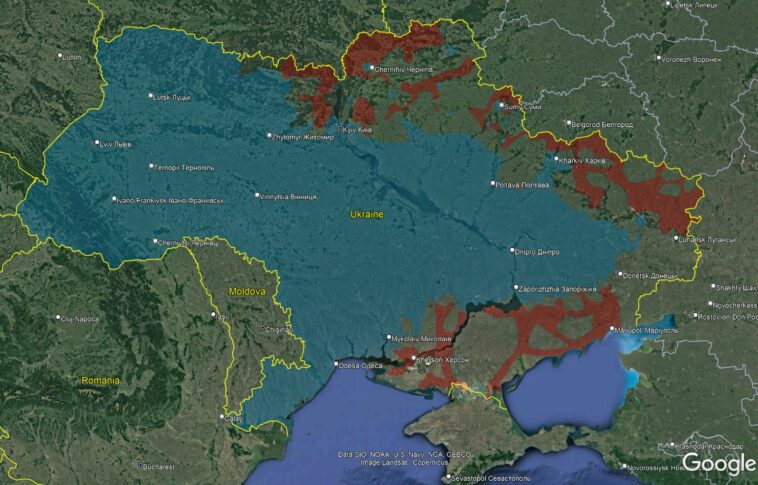Missile strike on Mykolayiv. At 08:45 on March 29, a Russian missile strike hit Mykolayiv’s regional administration. The strike destroyed the central part of the nine-story building from the ground floor to the eighth floor.
Russia conducted a strike in the hours when the personnel started work, head of the Mykolayiv regional administration Vitaliy Kim said. Twelve dead bodies were pulled from under the rubble. Thirty-three persons were injured. The Russian troops pulled back following unsuccessful attempts to seize Mykolayiv.
Russia pulls back from Kyiv and Chernihiv. After the Russian Ministry of Defense announced Tuesday that it has decided to “drastically reduce hostilities” in the Kyiv and Chernihiv directions, the United States is already observing these movements underway — a major strategy shift, according to two senior US officials, CNN said.
Russia is beginning to withdraw some forces, including Russian Battalion Tactical Groups (BTGs) leaving the surrounding areas around the Ukrainian capital.
Russia continues to pull back troops from Kyiv and Chernihiv regions. It regroups and concentrates on Slobozhanskyi and Donetsk axes, the General Staff of the Ukrainian Armed Forces said on March 29.
The Russian forces now pulling back in some areas of the north to focus on gains in the south and east. The U.S. assesses Russia will cover their retreat with air and artillery bombardment of the capital, one of the officials said. US officials caution that Russia could always reverse again if the battle conditions allow.
Since the invasion began, Russia has lost more than 17,000 troops, hundreds of tanks, more than 100 aircraft and thousands of other military pieces.
Istanbul peace talks. At peace talks in Istanbul on March 29, Ukraine called for an agreement on security guarantees for the country. Ukraine wants to see some of the members of the UN Security Council (the UK, China, Russia, the U.S., France, Turkey, Germany, Canada, Italy, Poland, and Israel) as guarantors of its security.
Ukraine calls for a clause in the agreement similar to NATO’s Article 5. Commitment to activate the article would be legally binding, member of Ukraine’s negotiation team Davyd Arakhamia said. Guarantors of Ukraine’s security would need to provide military assistance within three days maximum. International security guarantees will not apply to temporarily occupied areas of Donetsk and Luhansk regions, and Crimea.
If Ukraine gets attacked, the guarantors will have to send their troops and weapons to Ukraine, and enforce a no-fly zone.
Ukraine and Russia will decide on the status of Crimea and Sevastopol during bilateral talks in the next 15 years, Ukraine suggested.
Presidents of Ukraine and Russia should talk directly to decide on occupied territories in eastern Ukraine, the Ukrainian delegation said.
Ukraine could greenlight an international agreement on security guarantees after a national referendum, said advisor to the Office of the President of Ukraine Mykhailo Podolyak.
Ukraine in Flames #19. Difficult fates of Ukrainian pets and wildlife
750,000 dogs and 5.5 million cats have lived in Ukraine as of 2014. Thousands of them, large dogs in particular, have been abandoned by owners. Volunteers rescue abandoned and stray animals, maintain shelters, provide feed and evacuate pets to Poland. They risk their lives daily: three animal rescue volunteers were killed in Kharkiv while delivering dog food. Situation in zoos in war zones and in occupied territories is desperate. The Feldman Ecopark zoo in Kharkiv was damaged. Animals at “12 Months Zoo” near Kyiv and at Mykolaiv Zoo have begun to die from starvation and cold, as owners are running out of resources, and logistical chains take time to reset.
As Ukrainian Nature Conservation Group reposts, one-third of the wildlife protection areas and sites, including two biosphere reserves, are currently located in active war zones or under occupation. The biggest short-term threat are the raging fires and noise pollution that result from active combat and shelling. The Ukrainian government cannot deliver help to these territories, because its interventions are limited by the Russian occupation forces and bureaucratic difficulties. As at zoos, tourism no longer provides income, and logistics has been substantially complicated. As a result, natural reserves are in dire need of fodder, medicine and enclosure re-equipment, as well as solutions for evacuation, repair and re-equipment of its own special critical infrastructure.
Speakers:
Oleksii Vasyliuk, expert of Ukrainian Nature Conservation Group
Volunteers of the animal shelter “Sirius”




